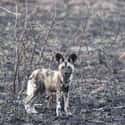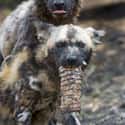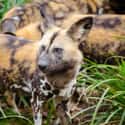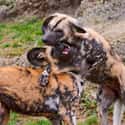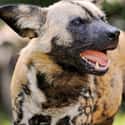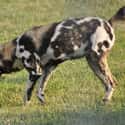-
(#10) Wild Dogs Give Birth To Large Litters Which Are Cared For By The Entire Pack
A typical litter for African wild dogs contains about 10 pups but can be as many as 20, which is more than most dogs in the animal kingdom. The babies are usually born in a safe location, such as a hole or thick bush, so they can easily be protected. Hunting members of the pack will bring food back for the pups and the youngest ones get eating priority over everyone else, including the head couple. One reason for the large amount of pups is their high rate of mortality. Pups may be killed by predators, disease, flooding, or a number of other things, and many new pups don't end up surviving long. Since African wild dogs want to keep their numbers up so hunting is easier, nature has insured that at least some will survive thanks to their large litter size.
-
(#2) They Are Able To Break Human-Made Traps
Although African wild dogs tend to act skittish and anxious when faced with a possible dangerous situation, they are also observing at the same time. Conservationists attempting to encourage more packs to form attempted to capture a breeding pair inside a cage trap. A hunk of meat was hung inside in order to tempt the dogs and they kept their distance until a pair eventually entered and was trapped. The rest of the pack immediately began circling the cage, picked up the rope attached to the door, and pulled it to open the door and free their friends. The dogs' ability to observe the situation before entering and understand how a contraption they had never seen before worked adds intelligence to their list of awesome traits.
-
(#8) Each Wild Dog Has Its Own Unique Coat Pattern Which Helps Other Pack Members Recognize Them
Lycaon pictus is the scientific name of the African wild dog and means "painted wolf." It's a very fitting name since each dog has a pattern of markings that may feature brown, white, black, red, or yellow, and is unique to each individual dog, much like a fingerprint. Since no two dog looks alike, this helps to not only distinguish each from one another, but also helps other dogs easily identify members of their pack. The tails of African wild dogs are very bushy with a bit of white on the tip, which helps them flag each other when using tail signals from a distance, especially while hunting. The patterns and earthy colors the dogs sport also help them camouflage into their surroundings very easily and adds to their effectiveness at capturing their prey.
-
(#5) They Have Vocalizations And Rituals To Greet Each Other
Unlike the lone cheetahs and badgers of the world, African wild dogs are extremely social and enjoy hanging out with one another. They can be very talkative as well and communicate with each other through different sounds, including whining, howling, and barking. Tail movement and touching each other with their noses or paws also give signals to each other. African wild dogs have been observed engaging in rituals when they greet one another where they may jump, shake their head, or vocalize their happiness at seeing their friends. Before a hunt, they may also help pump each other up like a sports team before a big game by licking, wagging, and yelping.
-
(#3) They Vote On Group Decisions By Sneezing
Researchers following five different African wild dog packs around the the Moremi Game Reserve discovered a perculiar way packs communicate with one another. When the dogs came together as a group before hunts or moving to a different location, each would often sneeze. Researchers noticed the more sneezes there were, the more often they moved or began their hunt soon after. They reasoned the dogs' sneezes were serving as a voting system, allowing each to contribute their opinion to what the pack did. The dominant pair still had partial control over the pack's decisions, as their sneezes appeared to have greater significance than those of the other dogs. Sneezing as a form of communication has been observed with jackals, coyotes, and domestic dogs in order to display anxiety or excitement, but it has never been seen used for the process of voting.
-
(#9) Researchers Believe Compatibility Play A Part In Pack Formation
African wild dogs tend to stick by their pack even while resting and unlike wolves, wild dogs are rarely seen on their own. Although researchers haven't been able to figure exactly how a group of wild dogs form themselves into a pack, they believe compatibility between the dogs matters. They have observed dogs undertaking a "trial" group that will separate without conflict if things don't work out, as well as separate hierarchies between the males and females of the pack. Because the wild dogs are so non-aggressive towards one another, how dominance is decided among pack members is a mystery as well, although it's possibly based on age. Creating the best possible pack is probably the main motive for the dogs, as having a tight knit group with members able to effectively work together will provide the best life for everyone in the pack.
New Random Displays Display All By Ranking
About This Tool
African wild dogs are the rarest carnivores in Africa. Because of their powerful hunting skills, African wild dogs are not appreciated by those who try to raise animals. With the reduction of habitat and competition from other large carnivores, their numbers are declining and became endangered. African wild dogs mainly live in the dry grasslands and semi-desert areas of Africa, never activities in dense forests.
The African wild dogs are cooperative hunting animal and live in close groups. It is very rare to have serious fights in the wild dog family. Although they look fierce, they are actually social dogs. The random tool will help you to know more information about African wild dogs.
Our data comes from Ranker, If you want to participate in the ranking of items displayed on this page, please click here.











